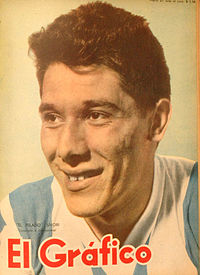Omar Sivori

Sívori with the Argentina national team in 1956
|
|||
| Personal information | |||
|---|---|---|---|
| Full name | Enrique Omar Sívori | ||
| Date of birth | 2 October 1935 | ||
| Place of birth | San Nicolás, Argentina | ||
| Date of death | 17 February 2005 (aged 69) | ||
| Place of death | San Nicolás, Argentina | ||
| Height | 1.63 m (5 ft 4 in) | ||
| Playing position | Striker | ||
| Senior career* | |||
| Years | Team | Apps | (Gls) |
| 1954–1957 | River Plate | 63 | (29) |
| 1957–1965 | Juventus | 215 | (135) |
| 1965–1969 | Napoli | 63 | (12) |
| Total | 341 | (176) | |
| National team | |||
| 1956–1957 | Argentina | 19 | (9) |
| 1961–1962 | Italy | 9 | (8) |
| Teams managed | |||
| 1969–1970 | Rosario Central | ||
| 1972 | Estudiantes de La Plata | ||
| 1972–1973 | Argentina | ||
| 1979 | Racing Club de Avellaneda | ||
| * Senior club appearances and goals counted for the domestic league only. |
|||
Enrique Omar Sívori (2 October 1935 – 17 February 2005) was an Italian Argentine football player and manager who played as a forward. At club level, he is known for his successful time with Italian side Juventus during the late 1950s and early 1960s; he also played for River Plate and Napoli.
At international level, he first appeared for the Argentine national team, winning the Copa América. Later in his career, he played for the Italian national team and took part in some of the 1962 World Cup. After his retirement as player, he coached several teams in Argentina, including the national side.
Regarded as one of the greatest players of his generation, Sívori's footballing talent was widely acclaimed, and he won the coveted European Footballer of the Year award in 1961.
Sívori was born in San Nicolás de los Arroyos, a town which falls within the Buenos Aires Province, in an Italian Argentine family. His paternal grandfather, Giulio Sivori, was an immigrant from Cavi di Lavagna, a hamlet in the province of Genoa, while his mother Carolina was of Abruzzian descent. As a youngster Sívori became heavily interested in the game of football and by the time he reached his teens he was signed up to a side from the city of Buenos Aires, River Plate. The teenage Sívori was given a chance to break through into a squad which included players like the famed forwards Ángel Labruna and Félix Loustau who established themselves in the era of La Máquina, one of the foremost formations in football history. He soon earned the nickname El Cabezón (bighead) from the fans, due to his playing style.
...
Wikipedia
